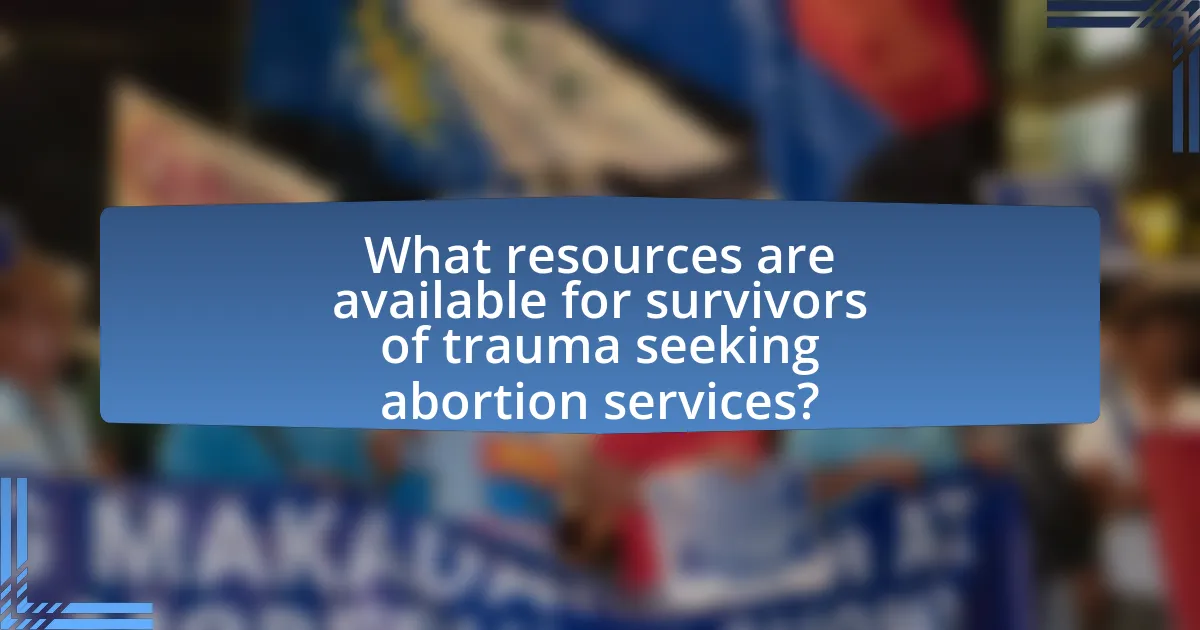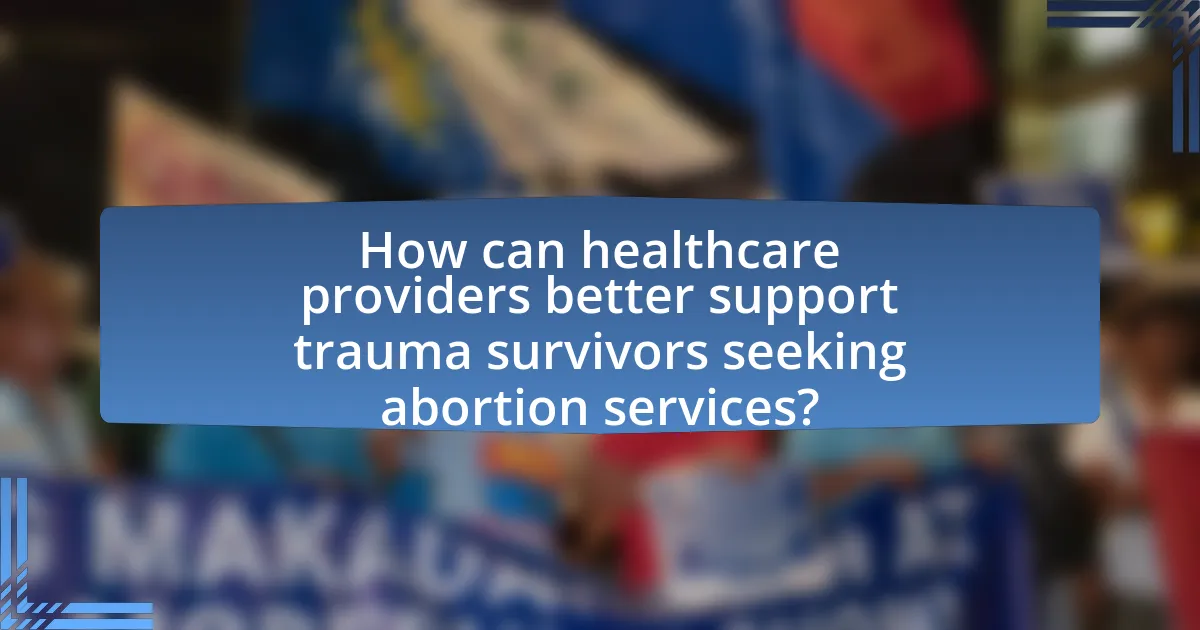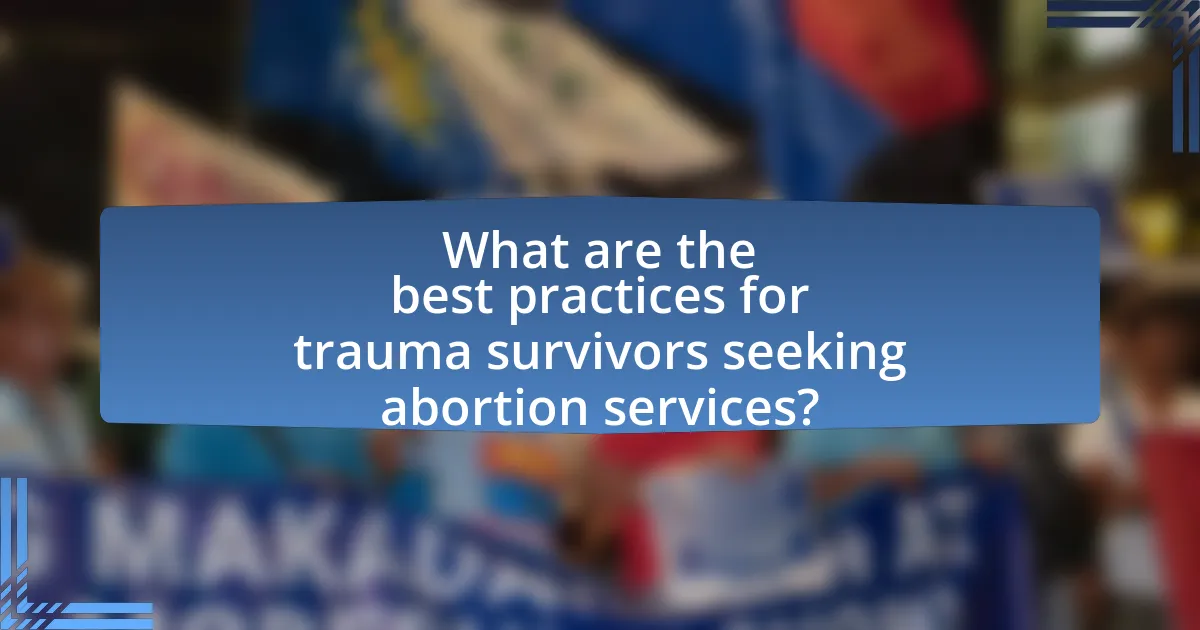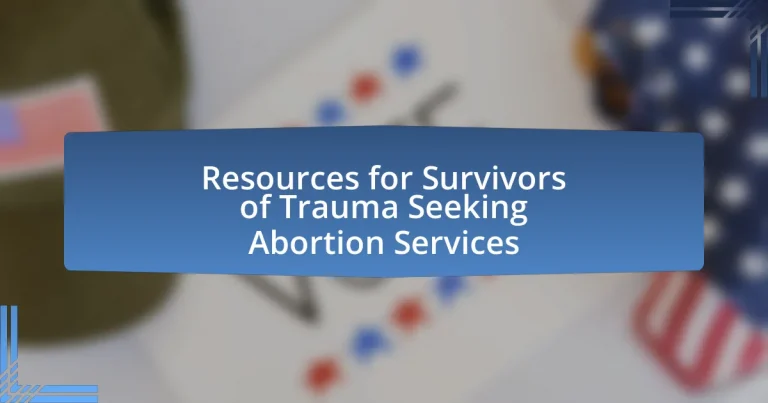The article focuses on the resources available for survivors of trauma seeking abortion services. It outlines various support systems, including specialized clinics, hotlines, and organizations like the National Abortion Federation and Planned Parenthood, which provide trauma-informed care and counseling. The article also discusses the challenges trauma survivors face when accessing abortion services, the emotional and psychological barriers they encounter, and the importance of trauma-informed practices in healthcare settings. Additionally, it highlights best practices for survivors to prepare for their appointments and advocate for their needs, as well as self-care strategies and ongoing emotional support resources available post-procedure.

What resources are available for survivors of trauma seeking abortion services?
Survivors of trauma seeking abortion services can access various resources, including specialized clinics, hotlines, and support organizations. For instance, the National Abortion Federation provides a directory of clinics that offer trauma-informed care, ensuring that survivors receive sensitive and appropriate support during the abortion process. Additionally, organizations like Planned Parenthood offer counseling services and can connect individuals with mental health professionals trained to assist trauma survivors. The Rape, Abuse & Incest National Network (RAINN) also offers a hotline that can provide guidance and resources for those in need. These resources are designed to create a supportive environment for survivors, addressing both their physical and emotional needs during this challenging time.
How can survivors of trauma access abortion services?
Survivors of trauma can access abortion services through specialized healthcare providers that offer trauma-informed care. These providers are trained to understand the unique needs of trauma survivors, ensuring a supportive and respectful environment during the abortion process. Research indicates that trauma-informed care improves patient outcomes and satisfaction, as it addresses both physical and emotional needs. Additionally, organizations such as Planned Parenthood and the National Abortion Federation provide resources and referrals specifically for survivors, facilitating access to safe and compassionate abortion services.
What types of organizations provide support for trauma survivors seeking abortions?
Organizations that provide support for trauma survivors seeking abortions include reproductive health clinics, nonprofit organizations focused on women’s health, and mental health services. Reproductive health clinics often offer comprehensive care, including counseling and medical services tailored for trauma survivors. Nonprofit organizations, such as Planned Parenthood and the National Abortion Federation, provide resources, financial assistance, and advocacy for individuals facing trauma. Additionally, mental health services, including therapists specializing in trauma-informed care, play a crucial role in supporting survivors through the emotional aspects of seeking an abortion. These organizations collectively ensure that trauma survivors receive the necessary medical and emotional support during their decision-making process.
How do these organizations ensure a safe environment for survivors?
Organizations ensure a safe environment for survivors by implementing trauma-informed care practices, which prioritize the emotional and physical safety of individuals. These practices include providing confidential services, trained staff who understand trauma responses, and creating a welcoming atmosphere that empowers survivors. For instance, many organizations offer private counseling sessions and support groups specifically designed for trauma survivors, ensuring that their needs are met in a respectful and understanding manner. Additionally, safety protocols are established to protect survivors from potential harm, including secure facilities and clear reporting mechanisms for any incidents.
What specific challenges do trauma survivors face when seeking abortion services?
Trauma survivors face significant challenges when seeking abortion services, primarily due to emotional distress and potential triggers related to their past experiences. These individuals may experience heightened anxiety, fear, or flashbacks during medical procedures, which can complicate their decision-making process and overall experience. Research indicates that approximately 30% of women who have experienced trauma report difficulties in accessing reproductive healthcare, including abortion services, due to these psychological barriers. Additionally, stigma and lack of understanding from healthcare providers can further exacerbate the challenges, leading to feelings of isolation and reluctance to seek necessary care.
How does trauma impact the decision-making process regarding abortion?
Trauma significantly influences the decision-making process regarding abortion by affecting emotional and psychological states. Survivors of trauma may experience heightened anxiety, depression, and feelings of helplessness, which can complicate their ability to make clear and confident decisions about their reproductive health. Research indicates that individuals with a history of trauma often face difficulties in processing information and may struggle with trust in healthcare providers, leading to delays or hesitations in seeking abortion services. A study published in the Journal of Trauma & Dissociation found that trauma exposure is linked to increased ambivalence about pregnancy termination, as survivors may grapple with conflicting emotions related to their past experiences. This interplay of trauma and decision-making underscores the need for sensitive and supportive resources tailored to the unique challenges faced by trauma survivors seeking abortion services.
What emotional and psychological barriers might survivors encounter?
Survivors of trauma seeking abortion services may encounter emotional and psychological barriers such as anxiety, depression, and feelings of guilt or shame. These barriers can stem from the trauma itself, societal stigma surrounding abortion, and fear of judgment from healthcare providers. Research indicates that approximately 30% of individuals who have experienced trauma report significant anxiety and depressive symptoms, which can complicate their decision-making process regarding abortion. Additionally, survivors may struggle with trust issues, making it difficult to engage with medical professionals, as highlighted in studies on trauma-informed care.
What types of support services are available for trauma survivors during the abortion process?
Trauma survivors during the abortion process can access various support services, including counseling, peer support groups, and medical assistance. Counseling services provide emotional support and coping strategies tailored to individual needs, often facilitated by trained professionals specializing in trauma. Peer support groups offer a safe space for survivors to share experiences and feelings with others who have faced similar challenges, fostering a sense of community and understanding. Additionally, medical assistance ensures that survivors receive comprehensive care throughout the abortion process, addressing both physical and emotional health needs. These services are crucial in helping trauma survivors navigate their experiences with empathy and understanding.
How can counseling services assist survivors in their decision-making?
Counseling services assist survivors in their decision-making by providing a supportive environment where they can explore their feelings, options, and the implications of their choices. These services facilitate informed decision-making by offering emotional support, helping survivors process trauma, and providing information about available resources and options. Research indicates that survivors who engage in counseling are more likely to make decisions that align with their values and needs, as counseling promotes clarity and empowerment in the decision-making process.
What role do peer support groups play in the recovery process?
Peer support groups play a crucial role in the recovery process by providing emotional support, shared experiences, and a sense of community among individuals facing similar challenges. These groups facilitate open discussions, allowing participants to express their feelings and concerns in a safe environment, which can significantly reduce feelings of isolation and anxiety. Research indicates that individuals who engage in peer support report higher levels of emotional well-being and resilience, as they benefit from the collective wisdom and coping strategies of others who have navigated similar experiences. For instance, a study published in the Journal of Trauma & Dissociation found that peer support can enhance recovery outcomes by fostering a sense of belonging and empowerment among participants.

How can healthcare providers better support trauma survivors seeking abortion services?
Healthcare providers can better support trauma survivors seeking abortion services by implementing trauma-informed care practices. Trauma-informed care involves recognizing the impact of trauma on individuals and creating a safe, supportive environment that prioritizes the survivor’s emotional and psychological well-being. Research indicates that trauma-informed approaches can significantly improve patient satisfaction and outcomes, as they foster trust and reduce anxiety during medical procedures. For instance, a study published in the Journal of Trauma & Dissociation highlights that healthcare settings adopting trauma-informed care principles report lower levels of patient distress and higher engagement in care. By training staff in trauma awareness, providing clear communication, and offering emotional support, healthcare providers can create a more compassionate and effective experience for trauma survivors seeking abortion services.
What training should healthcare providers receive to assist trauma survivors?
Healthcare providers should receive trauma-informed care training to effectively assist trauma survivors. This training emphasizes understanding the impact of trauma on individuals, recognizing signs of trauma, and creating a safe environment for patients. Evidence shows that trauma-informed care improves patient outcomes by fostering trust and reducing re-traumatization, as highlighted in the Substance Abuse and Mental Health Services Administration’s (SAMHSA) guidelines. Additionally, training should include specific strategies for addressing the unique needs of trauma survivors seeking abortion services, ensuring that providers are equipped to offer compassionate and sensitive care.
How can providers create a trauma-informed care environment?
Providers can create a trauma-informed care environment by implementing practices that prioritize safety, trustworthiness, and empowerment for patients. This includes training staff to recognize signs of trauma, ensuring confidentiality, and fostering open communication to allow patients to express their needs and concerns. Research indicates that trauma-informed care can significantly improve patient outcomes, as it acknowledges the impact of trauma on individuals and promotes a supportive atmosphere. For instance, the Substance Abuse and Mental Health Services Administration (SAMHSA) outlines key principles of trauma-informed care, emphasizing the importance of understanding trauma’s effects and integrating this understanding into all aspects of service delivery.
What communication strategies can enhance the experience for survivors?
Effective communication strategies that can enhance the experience for survivors include active listening, trauma-informed care, and clear, empathetic messaging. Active listening allows survivors to feel heard and validated, which is crucial for their emotional well-being. Trauma-informed care ensures that communication is sensitive to the survivor’s experiences, avoiding triggers and fostering a safe environment. Clear and empathetic messaging helps to convey information in a way that is respectful and supportive, reducing anxiety and confusion. Research indicates that these strategies can significantly improve the overall experience of survivors in healthcare settings, leading to better outcomes and increased satisfaction.
What resources are available for healthcare providers to improve their support for trauma survivors?
Healthcare providers can access various resources to enhance their support for trauma survivors, including training programs, guidelines, and support networks. The Substance Abuse and Mental Health Services Administration (SAMHSA) offers a Trauma-Informed Care Toolkit that provides strategies for integrating trauma-informed practices into healthcare settings. Additionally, the National Center for Trauma-Informed Care provides resources and training to help providers understand the impact of trauma and implement supportive practices. Research indicates that trauma-informed care improves patient outcomes, as evidenced by a study published in the Journal of Trauma & Dissociation, which found that such approaches lead to increased patient satisfaction and engagement in care.
Which organizations offer training and resources for trauma-informed care?
Organizations that offer training and resources for trauma-informed care include the Substance Abuse and Mental Health Services Administration (SAMHSA), the National Child Traumatic Stress Network (NCTSN), and the Trauma-Informed Care Implementation Resource Center. SAMHSA provides guidelines and training materials focused on trauma-informed approaches in various settings, while NCTSN offers resources specifically tailored for children and families affected by trauma. The Trauma-Informed Care Implementation Resource Center supports organizations in adopting trauma-informed practices through training and implementation tools.
How can providers access educational materials on trauma and abortion services?
Providers can access educational materials on trauma and abortion services through various reputable organizations and online platforms. Organizations such as the American College of Obstetricians and Gynecologists (ACOG) and the World Health Organization (WHO) offer comprehensive resources, including guidelines, training modules, and research articles specifically focused on trauma-informed care in abortion services. Additionally, platforms like the National Abortion Federation provide access to educational webinars and toolkits designed for healthcare providers. These resources are essential for enhancing understanding and improving the quality of care for individuals experiencing trauma in the context of abortion services.

What are the best practices for trauma survivors seeking abortion services?
Trauma survivors seeking abortion services should prioritize finding a supportive and understanding healthcare provider. It is essential for these individuals to seek clinics that specialize in trauma-informed care, which recognizes the impact of trauma on a person’s experience and provides a safe environment. Research indicates that trauma-informed care can significantly reduce anxiety and improve overall satisfaction with the abortion experience (Substance Abuse and Mental Health Services Administration, 2014). Additionally, survivors should consider accessing counseling services before and after the procedure to address any emotional distress and ensure they have the necessary support throughout the process.
How can survivors prepare for their appointment to ensure a supportive experience?
Survivors can prepare for their appointment by gathering relevant medical history, identifying support persons, and formulating questions or concerns in advance. Having medical records, including previous treatments or medications, helps healthcare providers understand the survivor’s needs better. Designating a trusted friend or family member to accompany them can provide emotional support during the appointment. Additionally, writing down specific questions about the procedure, potential risks, and available support services ensures that survivors receive comprehensive information tailored to their circumstances. This preparation fosters a more supportive and informed experience, ultimately enhancing the survivor’s comfort and confidence during the appointment.
What questions should survivors ask their healthcare providers?
Survivors should ask their healthcare providers about the available options for abortion services, including medical and surgical methods, and the associated risks and benefits of each. Additionally, survivors should inquire about the emotional and psychological support services available post-abortion, as trauma can impact mental health. It is also crucial for survivors to ask about the confidentiality of their medical records and the provider’s experience in handling cases involving trauma. These questions are essential for ensuring that survivors receive comprehensive care tailored to their specific needs and circumstances.
How can survivors advocate for their needs during the process?
Survivors can advocate for their needs during the process by clearly communicating their specific requirements and preferences to healthcare providers. This includes expressing any trauma-related concerns, requesting accommodations such as a private space, or asking for a support person to be present during consultations or procedures. Research indicates that effective communication between survivors and healthcare professionals can significantly improve the quality of care and emotional support provided, as highlighted in the study “Trauma-Informed Care in Health Settings” by the Substance Abuse and Mental Health Services Administration.
What self-care strategies can support trauma survivors during this time?
Self-care strategies that can support trauma survivors during this time include establishing a routine, engaging in mindfulness practices, and seeking social support. Establishing a routine provides structure and predictability, which can be comforting for individuals dealing with trauma. Mindfulness practices, such as meditation or deep-breathing exercises, have been shown to reduce anxiety and improve emotional regulation, as evidenced by research published in the Journal of Traumatic Stress, which highlights the benefits of mindfulness for trauma recovery. Additionally, seeking social support from trusted friends, family, or support groups can foster a sense of connection and understanding, which is crucial for healing.
How can mindfulness and relaxation techniques aid in coping with stress?
Mindfulness and relaxation techniques can significantly aid in coping with stress by promoting emotional regulation and reducing physiological responses associated with stress. These practices, such as meditation and deep breathing, activate the body’s relaxation response, which counteracts the stress response by lowering heart rate and blood pressure. Research indicates that mindfulness-based stress reduction (MBSR) programs can lead to a 30% reduction in perceived stress levels among participants, as shown in a study published in the Journal of Psychosomatic Research by Kabat-Zinn et al. (1992). By fostering present-moment awareness and acceptance, mindfulness helps individuals manage their thoughts and emotions more effectively, leading to improved mental health outcomes.
What resources are available for ongoing emotional support after the procedure?
Ongoing emotional support resources after an abortion procedure include counseling services, support groups, and hotlines specifically designed for individuals who have experienced trauma. Organizations such as the National Abortion Federation provide access to trained counselors who can offer emotional support and guidance. Additionally, local community health centers often have mental health professionals available for ongoing therapy. Support groups, both in-person and online, allow individuals to connect with others who have had similar experiences, fostering a sense of community and understanding. Hotlines, such as the National Domestic Violence Hotline, can provide immediate support and resources for those in need. These resources are essential for addressing emotional well-being and facilitating recovery after the procedure.


